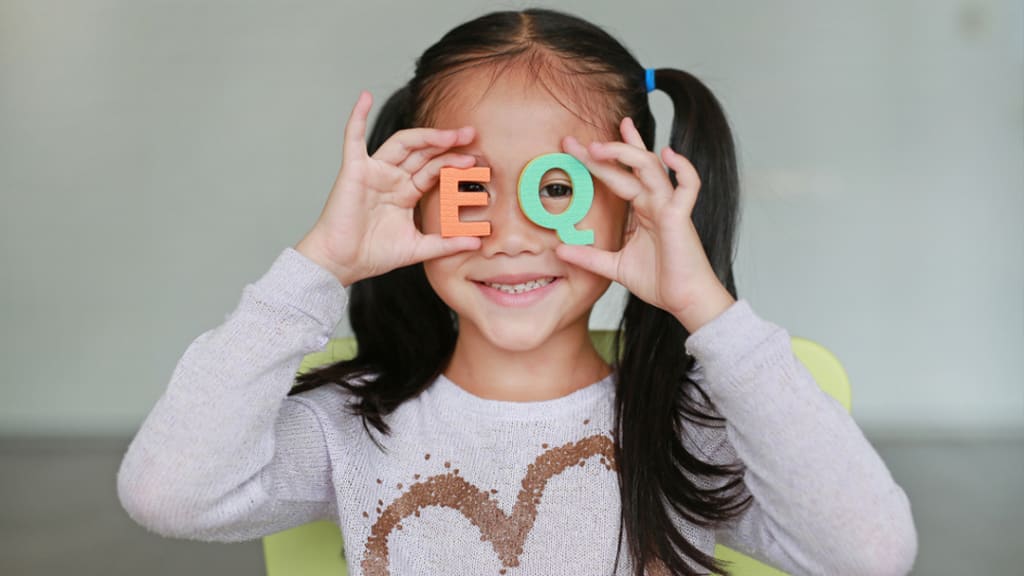Nurturing Emotional Intelligence in Children
How to nurture emotional intelligence in kids?

What exactly is emotional IQ? Simply put, it's the capacity to recognize, comprehend, control, and react to one's own and other people's emotions. It's an essential trait for creating lasting bonds, resolving problems, and making kind choices. How does this apply to young kids, then?
The Elements of Emotional Intelligence
Self-awareness
Helping young children become aware of their emotions is the first step in developing their emotional intelligence. Encourage your kids to express their emotions by talking to them about various feelings and emotions.
Empathy
The capacity to comprehend and empathize with another person's feelings is considered to be one of the key components of emotional intelligence. Children should learn to consider other people's perspectives. Say something like, "How do you think Tom felt when you took his toy?"
Managing Feelings
It is crucial to teach kids how to control their emotions. Children should learn that while it's normal to have emotions like anger or grief, it's also vital to remember that they shouldn't let these feelings dictate how they act.
Social Abilities
For emotional intelligence to flourish, social skills must be encouraged. Your youngster should be encouraged to play with others, share, and be kind to others.
Motivation
A key component of emotional intelligence is motivation, especially intrinsic motivation. Celebrate your child's accomplishments and encourage them to pursue their hobbies.
How to Teach Empathy to Kids?
Being emotionally intelligent begins with fostering empathy. Children who are taught to imagine themselves in another person's shoes are more likely to be kind and empathetic. Here are some tips for how you can teach empathy:
- Discuss feelings frequently and how they might affect others.
- Set an example: Show empathy through your words and deeds.
- Use Literature: Make use of literature featuring likable characters.
- Practice Active Listening: Show kids how to pay attention without interjecting.
- Role-play: Develop scenarios that allow kids to act out various circumstances.
Emotional intelligence benefits
Numerous benefits of emotional intelligence have a good effect on many aspects of life. Beyond academic success, developing emotional intelligence in children gives them access to vital abilities. The advantages of developing emotional intelligence include:
Developing Resistance
Young children's resilience is increased when we teach them emotional intelligence. Being able to overcome obstacles and recover from setbacks is essential in life. Children who have the skills to successfully manage their emotions are better prepared to handle any curve balls that life may toss their way.
Dispute Resolution
As they mature, children eventually run into problems with their siblings, friends, or classmates. Their emotional intelligence gives them the tools they need to settle conflicts amicably.
Encourage Leadership
Working well with others is an essential component of leadership in addition to taking the initiative. Effective leadership is built on a foundation of emotional intelligence. Since they have the social skills and empathy to relate to their peers, youngsters who are emotionally intelligent can naturally develop into leaders.
Educational Success
While IQ is frequently discussed in relation to academic success, emotional intelligence is just as important. Children that are emotionally intelligent are more likely to pay attention, be motivated, and be engaged in their studies, which helps them succeed academically.
Emotional intelligence: Various Influences
Understanding that every child is unique is crucial. How a child develops emotional intelligence is influenced by a number of variables, including temperament, family dynamics, and environment. Adapt your strategy to the particular circumstances and characteristics of your child. For instance, a shy youngster could require more support than an enthusiastic child to learn social skills.
Conclusion
Not merely a catchphrase, emotional intelligence is a fundamental ability that can influence young children's behavior and future. By recognizing and understanding emotions, learning via play, and being in an environment that fosters emotional development, children can succeed academically, emotionally, and socially. As a parent, you need to make sure your kids have the resources they need to grow in emotional intelligence.
About the Creator
Tappy Toes
Hello! Welcome to our page! We are professionals who are devoted to taking care of kids' mental and physical health. Following and writing interesting topics related to children is one of our favorite things. Enjoy reading our articles!
Enjoyed the story? Support the Creator.
Subscribe for free to receive all their stories in your feed. You could also pledge your support or give them a one-off tip, letting them know you appreciate their work.





Comments
There are no comments for this story
Be the first to respond and start the conversation.